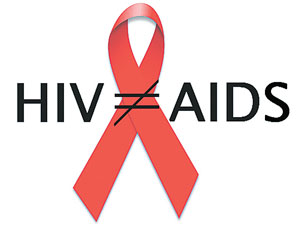- California Assembly OKs highest minimum wage in nation
- S. Korea unveils first graphic cigarette warnings
- US joins with South Korea, Japan in bid to deter North Korea
- LPGA golfer Chun In-gee finally back in action
- S. Korea won’t be top seed in final World Cup qualification round
- US men’s soccer misses 2nd straight Olympics
- US back on track in qualifying with 4-0 win over Guatemala
- High-intensity workout injuries spawn cottage industry
- CDC expands range of Zika mosquitoes into parts of Northeast
- Who knew? ‘The Walking Dead’ is helping families connect
HIV may evolve to cause AIDS less frequently
 New research has found that HIV may be evolving to become less aggressive, suggesting that in the future it may even be able to infect humans without causing AIDS.
New research has found that HIV may be evolving to become less aggressive, suggesting that in the future it may even be able to infect humans without causing AIDS.
Long-term analysis has shown that HIV-inflicted females in South Africa are more likely to have AIDS than a similar group in Botswana, where the disease arrived a decade earlier. The stark comparison indicates that HIV eventually evolves into a less virulent form, according to the study published recently in the Proceedings of the National Academy of Sciences.
In the Botswana study, HIV had apparently evolved to adapt to a protein that shields the body from the virus. This becomes a strange double-edged sword. Patients will lose the “protective” nature of the protein, but the ability of the virus to replicate is significantly reduced.
“If this process is something we can see continuing as a trend, then the ability of HIV to cause disease will become less and less over time,”Philip Goulder, a professor of pediatric immunology at the University of Oxford and the study’s lead author, said in an interview. HIV infects roughly 35 million people around the world,according to the World Health Organization, and about one-third receive antiretroviral therapies, which is the standard treatment. According to Philip Goulder, about half of 1 percent of people with HIV will never develop AIDS, and that proportion will probably grow.
Most importantly, the recent study indicates that treatment with antiretroviral drugs speeds the evolution of HIV into a less virulent form. Regardless, this is a positive sign for the development of HIV treatment because it is a further step into understanding the prevalence of longevity of the dangerous virus.
Goulder is optimistic as well, stating “changes in HIV are a rare opportunity for scientists.” This is a monumental time in history where a drastic evolution of HIV is occurring right before our eyes. We have never been able to view these types of discrepancies in so much detail and hopefully, it leads to the eventual cure and successful treatment so that future generations can experience remission from the deadly viral disease.
 |
Serin Lee Van Nuys High Schooll 10th Grade |
















kelly
November 27, 2017 at 2:06 PM
yes..I like the basic concepts behind Second Life but it seems incredibly outdated and when I played it was intensely non-intuitive / user friendly to an extent that made EVE look like a game for toddlers. thanks from
togel online